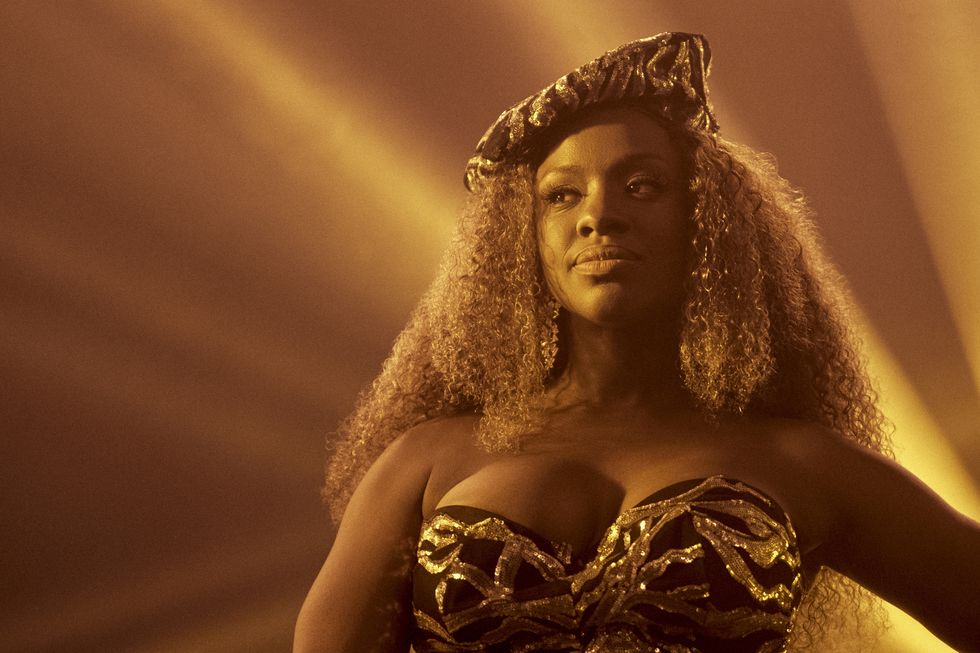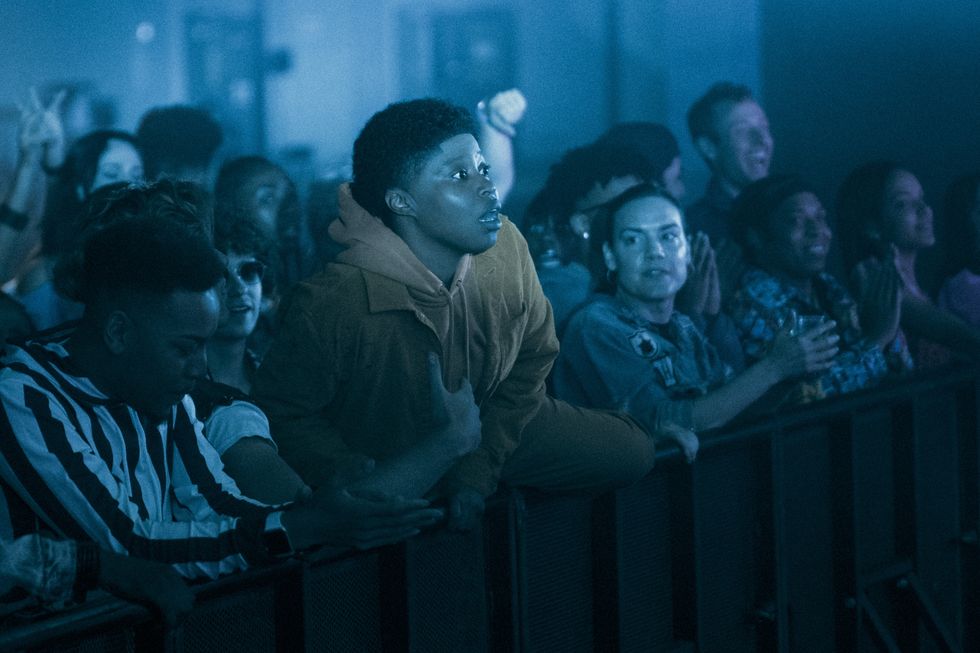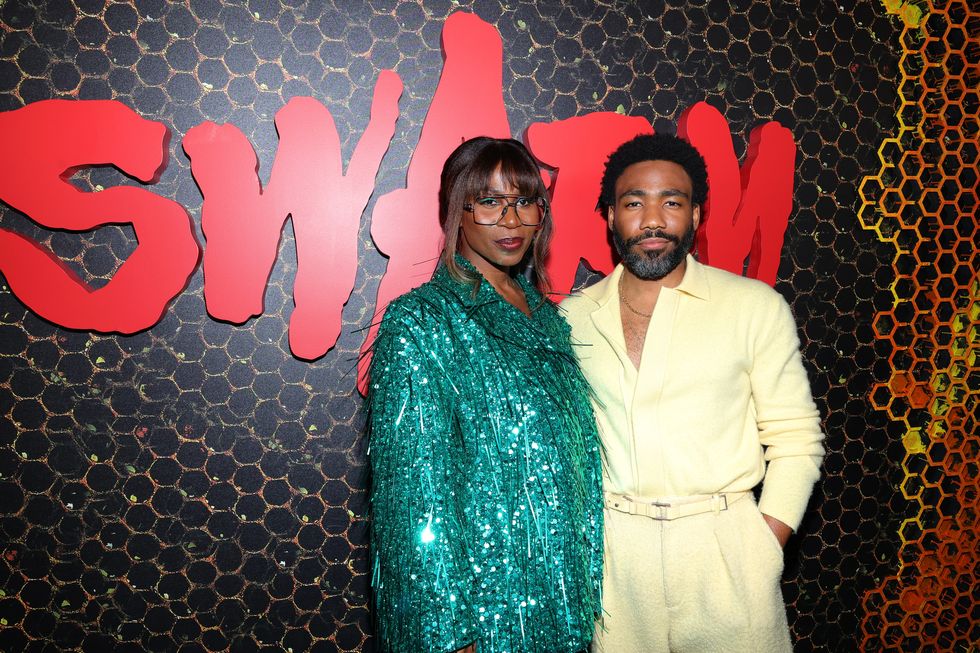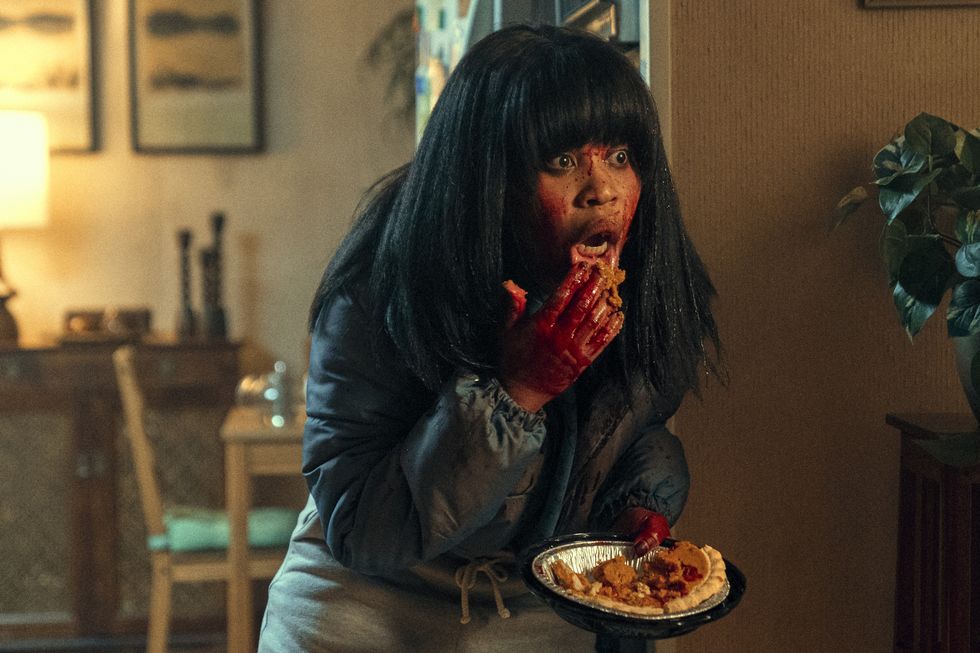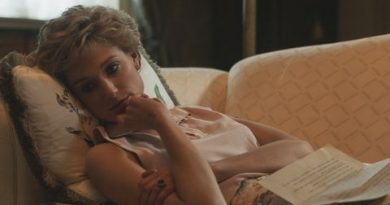The Swarm Creators Wanted to Start Conversation—And They Did
Spoilers below.
Everyone’s talking about Swarm. Ever since the Prime Video series premiered on Friday, the internet has been buzzing with reactions, memes, hot takes, theories, and various forms of discourse, whether it’s about sex scenes, celebrity guest stars, or the protagonist’s characterization; but all this chatter is exactly what co-creators and Atlanta collaborators Janine Nabers and Donald Glover intended.
“I’m not on Twitter; I’ve heard it’s creating a lot of conversation,” Nabers tells ELLE.com. “This is what we wanted. We wanted people to pull back the curtain of this story and then have conversations online about it. So I feel like we’ve done our jobs.”
More From ELLE

There is plenty to talk about: The seven-episode surrealist thriller follows a young woman named Andrea “Dre” Greene (the magnificent Dominique Fishback), an obsessive superfan of the pop star Ni’Jah, who is a clear analog for Beyoncé. The parallels are obvious: Lemonade-like visuals, rumors of someone biting her at a party, footage of a fight in an elevator, cheating husband allegations, and a fandom dubbed “the Swarm” rather than “the BeyHive.” (Nabers has said she thinks Beyoncé knows about the show.) Dre, however, takes stan-dom to an extreme, brutally killing those who speak ill of her favorite artist. Following the shocking death of her sister Marissa (Chloe Bailey) in the pilot, each new episode finds Dre in a different town with new company and new victims over the years. Her own mysterious history slowly comes to light as the story unfolds.
There’s a witty disclaimer at the beginning of each episode that boldly declares: “This is not a work of fiction. Any similarity to actual persons, living or dead, or actual events, is intentional.” Yet, Swarm’s real-life similarities go even further than the fans. Plot points are also inspired by true events, from a group of strippers killing a man who changed their flat tire to the NXIVM subgroup DOS. The show even gets so meta it includes a clip of the real-life Glover giving a red carpet interview discussing his plans to make Swarm. This blending of surreal elements may be familiar to Atlanta viewers, but Swarm takes the blurring of fiction and reality to another level. (For example, the scene of Dre biting Ni’Jah overlaps with footage of her euphorically eating sweets.) “That’s what makes it TV. That’s what makes it fun. That’s what makes it us,” Nabers says.
Glover reportedly got the idea for a Black female serial killer character from a viral tweet, then pitched the idea to Nabers. “I think as a Black woman,” she explains, “I was very much just into this idea of, well, who are the serial killers that look like me? And do they exist?” She notes that Black women can be overlooked when it comes to crime, too, which they made sure to explore in Swarm. “No one’s able to really give [Dre’s] body of work the analysis that it deserves…in the way that you look at Ted Bundy,” she says. “I mean, his Wikipedia page is crazy.”
We talked to Nabers about modern fandom, creating Ni’Jah, and creating a Black woman serial killer. Read the interview below.
Obviously, fandoms aren’t new, but I think Swarm arrives at an interesting time after seeing firsthand the power stans can have, like how Swifties held Ticketmaster accountable, or when BTS fans trolled back at right-wing trolls. But we have also seen how fans can attack people who criticize or insult their idol, or come at one another. Even the Selena Gomez-Hailey Bieber “drama” was mostly concocted by their fans. What themes of fandom did you and the team want to explore with the series? Were there any specific moments or experiences that came to mind as you were writing?
In terms of theme, honestly, it really is just about taking events that existed on Twitter, on social media, as rumors or real news stories, real murders, and just connecting the dots with our character. That’s really what we set out to do. In terms of the conversation as a whole, I agree with what Donald says. There are so many people that have incredible fan bases, and the fact that we leaned more into Beyoncé, for us, it was really just a feeling. It’s really about the feeling that a Black woman gives you. And the amount of respect and the amount of adoration that every Black woman in my life has for someone like that is incredible.
How do you take all of those good things, all of those amazing qualifications for someone, and take that feeling and embody it so that other people who watch it on Twitter don’t think that it’s fake or made up? Or [so that] everyone feels it? Everyone knows what we were trying to do in terms of just connecting the dots between her mythology and this character that we’ve put into her scenarios. So I’m really proud of it. I’m really proud of the fact that people are forming their own conclusions.
As you mentioned, a lot of the imagery and events in the series do mirror Beyoncé and things that happened during her life and her career. What was the thought process behind making parts of the show so parallel to her, rather than creating a completely separate celebrity?
I think for us, again, it’s the feeling that that person evokes. There are just so many interesting stories that you read on the internet about someone or something, and you don’t know if it’s true. You’re like, “What is this story about? Who did this? Someone actually did this to someone?” Like The Bite [when Dre bites Ni’Jah’s face at a party, echoing 2018 rumors that someone bit Beyoncé], for example…that, to me, was always just, how do you get there? How do you get to a person and bite their face?
Taking Dre and just writing an episode where we literally see her get from point A to point B was really funny for us. And yeah, she’s doing all of these things, but that was always part of the challenge and the fun of telling the story. Taking these really salacious moments that everyone talks about, [that] every Black person I know has a theory on, and just putting our own spin on it, to me, is what makes entertainment dope, and that’s what made this process fun. We were just really happy that we were able to write the way that we wanted to write, and that Amazon really and legally gave us the privilege to do that.
When you say “legally,” does that mean going to Parkwood [Entertainment] and getting clearance for using photos and things like that?
I don’t honestly know. That is above my head, but at the end of the day, when you write something and you give it to the powers that be, and they go through all their little legal procedures with it, and then you get the script back, it’s like, okay, great! We’re done.
In that final scene when Dre finally arrives to the Ni’Jah show and gets onstage, instead of sending her away, Ni’Jah invites her to sing, the people cheer for her, and she brings her to her car. Was that how you pictured the ending from the start, or did it take some twists and turns in the writer’s room?
The writer’s room was broken by the time I was writing the finale. So I went and I actually pitched the entire episode to Donald. And because he really pitched the essence of the show to me, I really wanted him to give me an understanding of what he wanted the feeling of the ending to be. And that’s what it was. I don’t know if a lot of people know this, but that event is also based on a very true story of this man named Anthony who ran onstage in Atlanta and was arrested. So obviously there’s the reality, and then there’s our spin on it, which is what we did in our final moments.
It’s meant to lead people questioning themselves or the character or what they’ve seen. There are a lot of people that want endings that feel meaningful or feel like, oh, now I know exactly what all of this was about. The reason why it’s so ambiguous is because we really want people to conclude their own thought onto what that moment [was]. It was very much like a marriage of ideas between Donald and myself, that ending. And Dominique, who’s incredible, took that ending after reading it and made it her own. She put her own meaning on it. That’s what you want as a writer. You want an actor to take your words and put their own interpretation on it.
What was it like working with Dominique on the script?
We were really just open and honest with each other. She got most of the scripts pretty early on, and so she was able to talk about certain scenes that meant something to her, or certain scenes that might have been confusing. You rewrite every day when you’re on a set, especially if it’s raining and it’s not supposed to rain, or we had this actor but that actor had COVID, and so now this actor’s a woman. You have to just change on the spot. She was very much a part of that process. And so it was very collaborative…she’s a writer too, so she has her own thoughts on punctuations and the way that a sentence might be said, the different things that you can contextualize from the way this inflection is here, and all that. It’s very specific to her. So we gave her a lot of liberty to do what she wanted. You see that in her performance.
I thought the documentary episode was very clever, especially with the meta twist at the end when there’s a snippet of Donald’s interview talking about this series. What brought that about?
We always wanted that episode to be the real characters within the story that we were telling. The idea of “this is not a work of fiction,” that’s what that was. We were able to intellectualize Dre’s behavior a little bit more because it had that documentary format, but that was the way that we wanted to really talk about her past. We didn’t want to talk about her past in scenes. I wasn’t really interested in having a monologue about Dre and the people that were in her life before. We really, really just wanted to focus on being in the moment with the story of her and catching up to her in each episode as she reinvents herself. And then [give] the audience this kind of step-out episode where you really are then able to do a textbook analysis of Andrea.
On top of that, though, I think you do approach some serious, very timely topics in that episode, like when the detective mentions that Black women usually fall through the cracks. I’d love to hear more about how you wanted to convey that message.
America in general is really obsessed with murder, murder and crime, serial killers. You see so many serial killers in different TV formats and in movies. There’s a reason for that. I think as a Black woman, I was very much just into this idea of, well, who are the serial killers that look like me? And do they exist? And when Donald and I did our research, we found one. And it was like, really? It can’t be. We find it so hard to believe that there’s only one Black woman serial killer that has ever existed in the history of America.
And so because of that, it allowed us to really give space to this idea of Dre being a woman that we recognize but…she’s been a little bit of a fly on the wall in her own life, and that this saved her a little bit because she is a serial killer, but she’s fallen through the cracks. No one has been able to really pin her down. No one’s able to really give her body of work the analysis that it deserves—like, why she did this and what led her to this—in the way that you look at Ted Bundy. I mean, his Wikipedia page is crazy. There’s just so much. So many people have studied him. So how can we study this character [of Dre]?
That, for us, was always part of the theme of what this show is. But that particular episode, the documentary in general, was really just our way of doing that, but still making it funny and not making it as this very earnest way of looking at a murderer, which is what you will see with any other documentary about a murderer.
Swarm comes shortly after the new season of You and not too long after shows like Dahmer and many other true crime adaptations, whether they are documentaries or dramatized versions. How do you think Swarm, or a character like Dre, is in conversation with these other media that revolve around, and sometimes glorify, these white male serial killers? Does it respond to that conversation, or reject it entirely?
It makes it refreshing. It’s palatable because we’re not just saying the crimes are murders. We’re saying that these internet rumors are also crimes. Biting someone’s face…is a crime. I don’t care what anyone says. You just don’t do that. Running onstage and trying to—who knows? If he had gotten to her, what would he have done? Dominique says it best: “There’s a very thin line between love and hate.” There are people who can hug someone so hard that they take the air out of their lungs.
It’s really about looking at this idea of crime, rumors, the conversation, the violence of conversation, the violence of things that exist on the internet, and folding that into this kind of true crime element and giving that a voice in a way that is refreshing. So it’s not all about blood and murders. And all of the murders that we wrote about—no one had been talking about those strippers. I knew about those strippers for a year.
It’s just so fascinating. It’s such an incredible story. And so [we’re] just giving voice to things that people really don’t know about or understand, and that is where it feels refreshing and fun. It doesn’t feel like everything else.
Do you think this could go on for another season? Would you be interested in it?
This is definitely a limited series. The story of Dre is over.
What about an anthology? Another crazed superfan maybe?
I don’t know. If you look at the history of Atlanta, it took many, many years to complete that, so who knows? But as of right now, I’m saying we’re done.
This interview has been edited and condensed for clarity.
Erica Gonzales is the Senior Culture Editor at ELLE.com, where she oversees coverage on TV, movies, music, books, and more. She was previously an editor at HarpersBAZAAR.com. There is a 75 percent chance she’s listening to Lorde right now.


